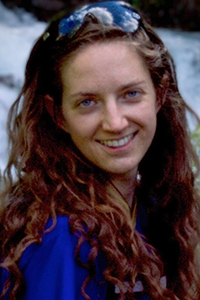Jessica Burl
Laboratory Instructor in Chemistry

- Office
- McCardell Bicentennial Hall 604
- jburl@middlebury.edu
- Office Hours
- Spring 2026: Tuesday & Wednesday 12-1pm, Friday 10am - 11am, and by appointment
Courses Taught
CHEM 0103
General Chemistry I
Course Description
General Chemistry I
Major topics will include atomic theory and atomic structure; chemical bonding; stoichiometry; introduction to chemical thermodynamics. States of matter; solutions and nuclear chemistry. Laboratory work deals with testing of theories by various quantitative methods. Students with strong secondary school preparation are encouraged to consult the department chair for permission to elect CHEM 0104 or CHEM 0107 in place of this course. CHEM 0103 is also an appropriate course for a student with little or no prior preparation in chemistry who would like to learn about basic chemical principles while fulfilling the SCI or DED distribution requirement. Students with AP Chemistry scores of 4 or 5 OR Chemistry Placement scores of 21 or higher are NOT allowed to enroll in CHEM 103. Students MUST have taken the Chemistry placement exam and earned a score of 20 or less. 3 hrs. lect., 3 hrs. lab, 1 hr. disc.
Terms Taught
Requirements
CHEM 0105
Current
General Chemistry
Course Description
General Chemistry
In this course we will introduce students to the fundamental theories and concepts in chemistry. We will consider matter at the electronic level and build up to various bonding theories, apply thermodynamics to explore physical and chemical processes, and study fundamental concepts of equilibrium and kinetics. Class time will include short lectures and group-based problem-solving sessions. Lab work includes qualitative and quantitative analysis, kinetics, and acid-base chemistry. (CHEM 0102 or equivalent as demonstrated by AP/IB exam or placement exam scores go/chemplacement) 3 hrs. lect., 3 hrs. lab. (formerly CHEM 0104)
Terms Taught
Requirements
CHEM 0203
Organic I: Struct & Reactivity
Course Description
Organic Chemistry I: Structure and Reactivity
The course will provide students with an introduction to the structure and reactivity of organic molecules sufficient to continue directly to the study of biochemistry (CHEM 0322). Topics covered will include models of chemical bonding, acid-base relationships, three-dimensional molecular structure (conformations and stereochemistry), reaction mechanisms and energy diagrams, substitution and elimination reactions, carbonyl reactions (additions, reductions, interconversions, and alpha-reactivity), and the fundamentals of biological molecules (carbohydrates, DNA, and RNA). Laboratory experiments will relate to purification techniques (recrystallization, distillation, extraction, and chromatography), as well as microscale organic reactions that complement the lecture material. (CHEM 0104 or CHEM 0107) 3 hrs. lect., 3 hrs. lab.
Terms Taught
Requirements
CHEM 0204
Organic II: Synthesis & Spect
Course Description
Organic Chemistry II: Synthesis and Spectroscopy
In this course we will explore how organic molecules are made and their structures are identified. The study of organic reactions will continue from CHEM 0203 with radical reactions, alkene and alkyne additions, aromatic reactions, oxidations and reductions, and additional carbonyl reactions. Emphasis in this course will be placed on using reactions in sequences to synthesize larger and more complex molecules. The theory and practice of mass spectrometry and UV-Vis, IR, and NMR spectroscopy will be studied as a means to elucidate the exact structures of organic molecules. Laboratory experiments will focus on synthetic techniques that complement the lecture material and the identification of complex unknowns via
GC-MS, IR, and NMR. (CHEM 0203) 3 hrs. lect., 3 hrs. lab.
Terms Taught
CHEM 0205
Current
Organic I: Struct & Reactivity
Course Description
Organic Chemistry I: Structure and Reactivity
In this course we will provide students with an introduction to the structure and reactivity of organic molecules sufficient to continue directly to the study of biochemistry (CHEM 0322). Topics covered will include models of chemical bonding, acid-base relationships, three-dimensional molecular structure (conformations and stereochemistry), reaction mechanisms and energy diagrams, substitution and elimination reactions, carbonyl reactions (additions, reductions, interconversions, and alpha-reactivity), and the fundamentals of biological molecules (carbohydrates, DNA, and RNA). Laboratory experiments will relate to purification techniques (recrystallization, distillation, extraction, and chromatography), as well as microscale organic reactions that complement the lecture material. (CHEM 0104 or CHEM 0105 or CHEM 0107) 3 hrs. lect., 3 hrs. lab. (formerly CHEM 0203)
Terms Taught
Requirements
CHEM 0305
Organic II: Synthesis & Spect.
Course Description
Organic Chemistry II: Synthesis and Spectroscopy
In this course students will explore how organic molecules are made and their structures are identified. The study of organic reactions will continue from CHEM 0205 with radical reactions, alkene and alkyne additions, aromatic reactions, oxidations, reductions, and additional carbonyl reactions. Emphasis will be placed on using reactions in sequences to synthesize larger and more complex molecules. The theory and practice of mass spectrometry and UV-Vis, IR, and NMR spectroscopy will be studied as a means to elucidate the exact structures of organic molecules. Laboratory experiments will focus on synthetic techniques that complement the lecture material and the identification of complex unknowns via spectrometry and spectroscopic techniques. (CHEM 0203 or CHEM 0205) 3 hrs. lect., 3 hrs. lab. (formerly CHEM 0204)
Terms Taught
